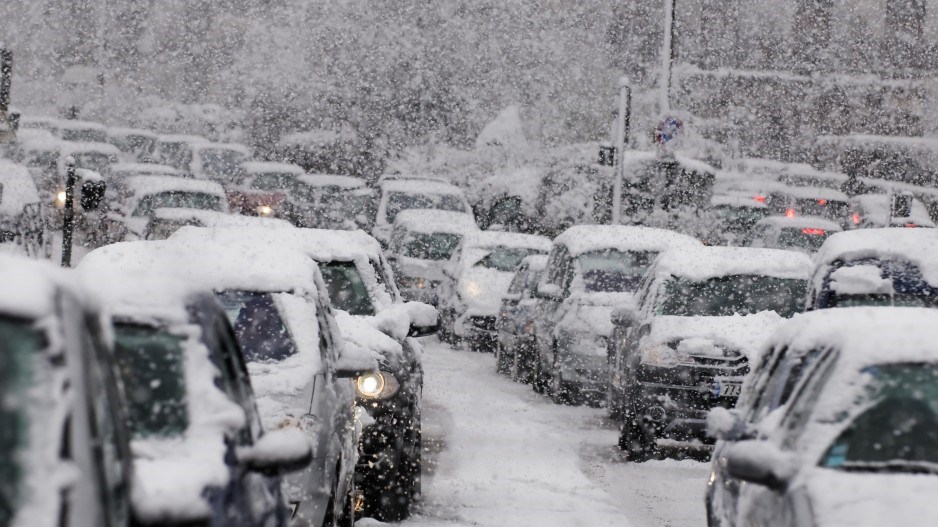As Canadian snowstorms go, the experience of British Columbians last month seemed uneventful when compared to the grisly situation that the residents of Newfoundland and Labrador endured. Social media posts from Atlantic Canadians were filled with seemingly impossible snow-clearing assignments, as well as wholly covered parked vehicles.
In Metro Vancouver and Greater Victoria, snow can wreak havoc on the daily commute in ways that we do not see in other large Canadian municipalities. Our climate does not suggest that British Columbia would follow the lead of Quebec and make winter tires mandatory, but there continue to be reports of car crashes and stranded transit vehicles whenever snow arrives.
Research Co. asked British Columbians about last month’s snowstorm, and the findings suggest that the biggest disappointment came from residents and not administrations. Half of British Columbians (49%) say they witnessed neighbours who did not shovel snow on their sidewalk – as is required by existing bylaws in most areas. The proportion of residents who recall the inattentiveness of their neighbours was higher on Vancouver Island (52%) and in the Fraser Valley (51%) and Metro Vancouver (50%).
During the snowstorm, social media was flooded with pictures of people who chose to drive before properly clearing all the snow on their vehicle. Once again, almost half of British Columbians (48%) saw a vehicle with snow on the top circulating in their municipality. This time, it is southern B.C. that went slightly higher than the provincial average (52%).
School closures can create a panic for British Columbians who may find it difficult to arrange proper care for their children. Some bosses are more understanding than others, but there are positions that definitely require workers to show up on time and on site.
We found that three in 10 British Columbians (31%) say that someone in their household worked from home on account of the snowstorm. The proportion of “weather telecommuters” jumps to 39% among those aged 18 to 34.
Before anybody pretends to look at this particular statistic as a way to put millennials down for staying at home, it must be acknowledged that finding alternative forms of transportation for people who usually drive can be immensely challenging.
Across the province, two in five British Columbians (39%) reveal that they chose not to drive their own vehicle on account of the snowstorm. Women were decidedly more cautious than men (44% to 33%). Drivers aged 55 and over (51%) were more likely to eschew driving their own vehicle than those aged 35 to 54 (33%) and those aged 18 to 34 (36%).
Across the province, municipalities seem to have left more residents happy than disappointed. Three in five British Columbians (61%) say they are “satisfied” with the way their municipality handled snow clearing on roads, while one third (34%) claim to be “dissatisfied.” The level of satisfaction was highest on Vancouver Island (66%), followed by Metro Vancouver and northern B.C. (62% each), southern B.C. (54%) and the Fraser Valley (51%).
Snow clearing on sidewalks – our responsibility as residents – did not fare as well, with 54% of British Columbians claiming to be “satisfied” and 39% saying they are “dissatisfied.” The most responsible neighbours are found in northern B.C., where 77% of residents are satisfied with how sidewalks looked and felt during the snowstorm. The proportion is lower in Metro Vancouver (54%), southern B.C. (52%), Vancouver Island (49%) and the Fraser Valley (41%).
The survey also shows a high level of satisfaction (68%) with the timeliness of alerts, such as school closures. In addition, 51% of British Columbians appreciated the responsiveness of municipalities to requests on social media and only 19% felt dissatisfied.
Across the province, almost three in 10 British Columbians (29%) believe that, compared to five years ago, their municipality is getting better when it comes to dealing with snow. This proportion grows to 40% among those aged 18 to 34 and to an eye-catching 57% in northern B.C.
However, 16% of British Columbians are convinced that their municipality is getting worse at handling snow – including 23% of southern B.C. residents and 22% of those who live in the Fraser Valley.
While there is no way to know exactly how cities and residents will deal with the next snowstorm, some regional quirks are evident. Those who live in northern B.C feel the performance of their neighbours and their shovels was particularly admirable, while Vancouver Islanders laud the work of municipal governments to keep the roads clear of snow. Fraser Valley residents were the most critical of both elected officials and dwellers.
Mario Canseco is president of Research Co.
Results are based on an online study conducted from January 21–24, 2020, among 800 adults in British Columbia. The data has been statistically weighted according to Canadian census figures for age, gender and region in Canada. The margin of error, which measures sample variability, is plus or minus 3.5 percentage points, 19 times out of 20.




